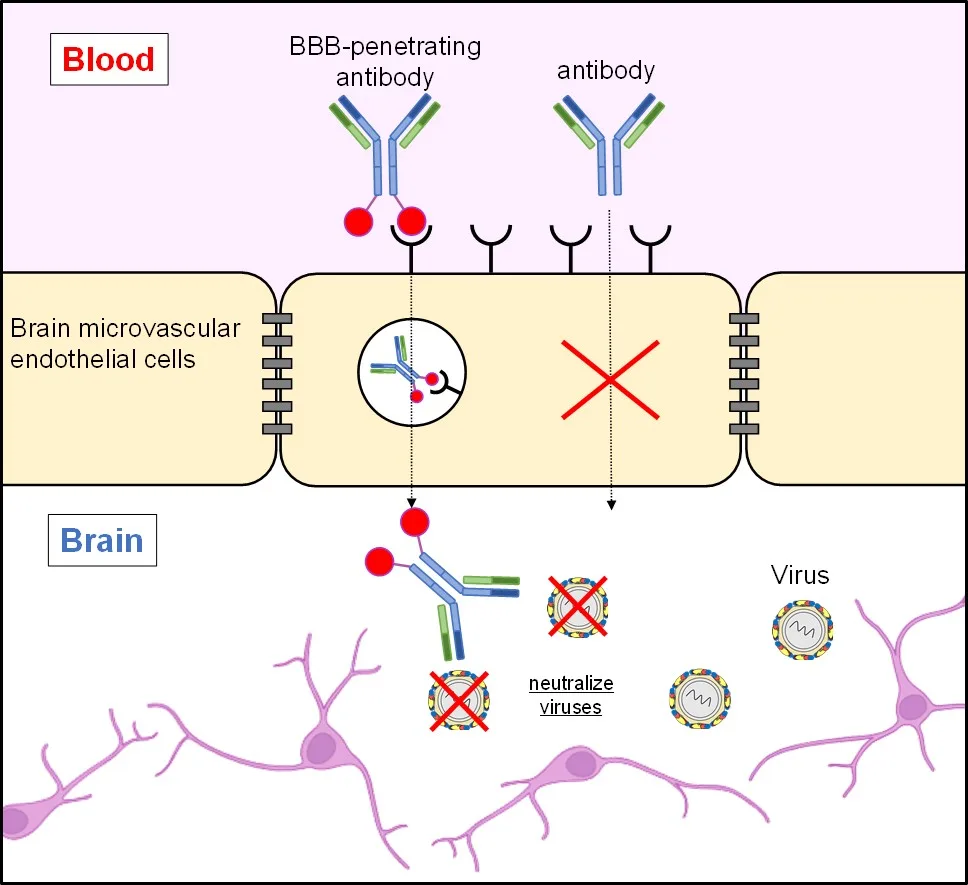

Development of blood-brain barrier-penetrating antibodies for neutralizing tick-borne encephalitis virus in the brain
Professor Kentaro Yoshii of the National Research Center for the Control and Prevention of Infectious Diseases at Nagasaki University, in collaboration with a research group that includes Professor Satoru Konnai and Associate Professor Shintaro Kobayashi of the Faculty of Veterinary Medicine at Hokkaido University, has developed recombinant anti-TBEV antibodies fused with blood-brain barrier (BBB)-penetrating rabies virus glycoprotein (RVG) peptides (referred to as “BBB-penetrating antibodies” in the figure below).
The group demonstrated that these antibodies can neutralize tick-borne encephalitis virus (TBEV) from the brain after infection. Given that TBEV causes encephalitis in patients both in Japan and internationally, this discovery offers promising potential for the development of therapies targeting TBE and other viral neurological diseases.
The study was published in mSphere, a journal of the American Society for Microbiology, on July 7, 2025.
Tick-borne encephalitis virus (TBEV) belongs to the genus Flavivirus and causes tick-borne encephalitis (TBE), a disease characterized by severe neurological symptoms with a high mortality rate. Currently, no specific antiviral treatments have been developed for TBE. The blood-brain barrier (BBB) restricts drug delivery to the central nervous system, posing a major challenge in developing effective therapies targeting TBEV in the brain. In this study, we developed recombinant anti-TBEV antibodies fused with BBB-penetrating rabies virus glycoprotein (RVG) peptides to facilitate their transport across the BBB. The fusion of RVG peptides to the C-terminus of the heavy chain of whole antibodies or single-chain variable-fragment had minimal impact on their neutralizing ability against TBEV. RVG fusion enhanced antibody binding to the surface of a human brain endothelial cell line and increased permeability in an in vitro BBB model. The RVG-fused antibodies exhibited higher transport efficiency to the brain than the non-fused antibodies following peripheral injection in mice. Notably, peripheral administration of the RVG-fused whole antibody after viral invasion into the brain significantly neutralized TBEV in the brains of infected mice. These findings suggest that RVG-fused antibodies represent a promising therapeutic strategy for treating TBE once virus has entered the brain.
Keywords: Tick-borne encephalitis virus, Blood-brain barrier, Rabies virus glycoprotein, Recombinant antibody

Journal: mSphere (American Society for Microbiology)
Title: Development of Blood-Brain Barrier-Penetrating Antibodies for Neutralizing Tick-Borne Encephalitis Virus in the Brain
Authors:
Corresponding Author:
Kentaro Yoshii
Address: 1-12-4 Sakamoto, Nagasaki City 852-8523, Japan
Phone: +81-95-819-8595
Email: kyoshii@nagasaki-u.ac.jp
Publication Date: July 7, 2025
DOI: https://journals.asm.org/doi/10.1128/msphere.00184-25
For more details, please see the full article on Nagasaki University’s Academic Output SITE.
.